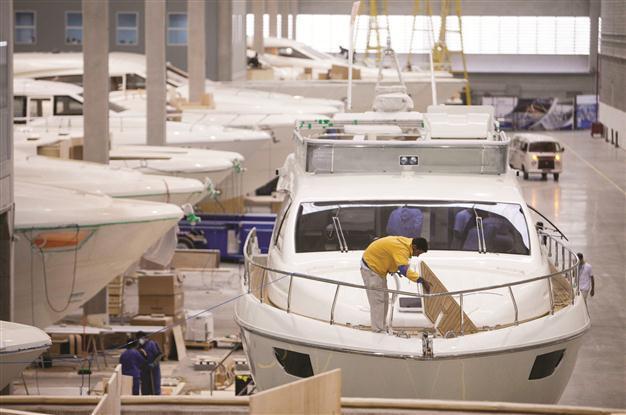Ferretti deal poses questions for sector
ISTANBUL - Hürriyet Daily News

People work at the Ferretti Group shipyard in Vargem Grande Paulista, close to Sao Paulo, Brazil. A Chinese company has bought a 75 percent stake in the yacht maker. REUTERS photo
A Chinese company’s acquisition of a 75 percent stake in Italy’s Ferretti, a major European yacht manufacturer, displays the growing Chinese economic clout in the West. However, according to a Turkish yacht company executive, the acquisition brings forward the question of skilled labor – a key trait in the yacht-building business.China’s Shandong Heavy Industry Group-Weichai Group said Jan. 10 that it had acquired the Ferretti stake for 374 million euros. The company will help Ferretti expand distribution in China and other emerging markets, it said.
“Developing the yacht business is one of the group’s strategic goals for the next five years,” the Associated Press quoted SHIG-Weichai Group’s chairman, Tan Xuguang, as saying.
“We had been hearing [rumors on this acquisition] since the Cannes Boat Show 2011 in September,” Ali Tanır, the marketing director for Vicem Yachts, said in response to questions from the Hürriyet Daily News.
“Now, it is very important to see where the [Chinese firm] will decide to continue production,” Tanır said.
Eight shipyards in Itay
The acquisition is part of a debt restructuring for Ferretti, which was hurt by the 2008 global crisis and a downturn in demand. The company, which says it is the world’s biggest luxury yacht manufacturer, has eight shipyards in Italy and in Miami, with nearly 2,000 employees.
“Turkish yacht builders have been striving all around the world to make people see that we offer quality and craftsmanship,” Tanır said. “Meanwhile, our European competitors had been trying to kill our strategy by saying that our production quality and [labor qualifications] were on a level lower than those in Europe. Now, there is a possibility to move the production of a key brand to a country that’s known as a center of low-quality production.”
















